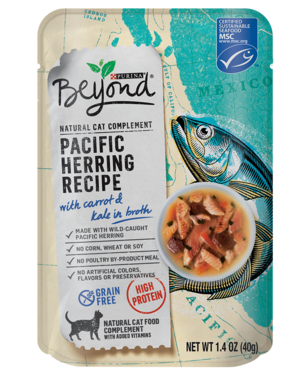Purina Beyond Complements Pacific Herring Recipe For Cats Review
PawDiet has been helping pet owners since 2015. To fund our efforts, articles may include affiliate links; if you buy something through a link, we may earn a commission.
Review of Purina Beyond Complements Pacific Herring Recipe For Cats
According to our most recent data, this product is intended for intermittent or supplemental feeding only.
Review of Ingredients
In our review of Purina Beyond Complements Pacific Herring Recipe For Cats, we'll examine all 8 ingredients and highlight the nutritional contribution of each ingredient.
While the first few ingredients typically dominate the recipe's composition, ingredients in small quantities can still have a meaningful impact on the overall nutritional profile of the recipe.
Herring Broth is a flavorful, nutrient-rich liquid made from herring that helps to hydrate and enhance the taste of your cat's food, making it more appealing and enjoyable.
Herring is a nutrient-dense fish that provides high-quality protein, Omega-3 fatty acids, and essential vitamins and minerals for cats. It supports muscle growth, a healthy immune system, and promotes a shiny coat.
Dried carrot is a natural source of vitamins and minerals, particularly beta-carotene, which is essential for maintaining your cat's eye health and supporting their immune system.
Kale is a nutrient-dense green that provides cats with essential vitamins, minerals, and antioxidants to support overall health and immune function.
Guar Gum is a natural thickening agent and stabilizer, which helps to maintain the texture and consistency of wet cat food while also providing a source of soluble fiber for digestive health.
Xanthan Gum is a natural thickening agent and stabilizer used in cat food to improve texture and consistency, ensuring a more palatable and enjoyable meal for your feline friend.
Vitamin E Supplement is an essential nutrient that plays a vital role in supporting your cat's immune system, skin health, and overall well-being. It also acts as a powerful antioxidant, protecting your cat's cells from damage caused by free radicals.
Thiamine mononitrate is a source of Vitamin B1, essential for energy metabolism and nervous system function in cats.
Review of Guaranteed Analysis
The crude protein value of 7.00% is primarily contributed by the herring, which is the second ingredient listed and a high-quality source of animal protein. Fish like herring are rich in proteins that are essential for the growth, maintenance, and overall health of cats. The herring broth may also contain some protein, but it is mostly water and serves to add moisture and flavor to the food.
The crude fat content at a minimum of 0.05% is notably low, which is somewhat unusual for cat food since cats require a moderate amount of fat for energy. The herring would be the primary contributor to this fat content. However, given the low percentage, it suggests that the herring used in this recipe is either very lean or that the fat has been reduced during processing.
Crude fiber at a maximum of 1.00% is derived from the plant-based ingredients in the food, specifically the dried carrots and kale. These ingredients provide dietary fiber which aids in digestion and helps to maintain healthy bowel movements. The low fiber content indicates that these ingredients are included in small amounts, as both carrots and kale can be higher in fiber.
The calorie content of 557.00 per kg is a measure of the energy provided by the food. This energy comes from the three macronutrients: protein, fat, and carbohydrates. In this case, the primary source of calories is likely the protein from herring since the fat content is very low. Carbohydrates would also contribute to the calorie count, which could be provided by the carrots and possibly small amounts from the other ingredients like guar gum and xanthan gum, which are used as thickeners and stabilizers.
Guar gum and xanthan gum, along with the vitamin supplements listed (Vitamin E Supplement, Thiamine Mononitrate or Vitamin B-1), do not significantly contribute to the macronutrient values but are important for the food's texture and nutritional completeness.

